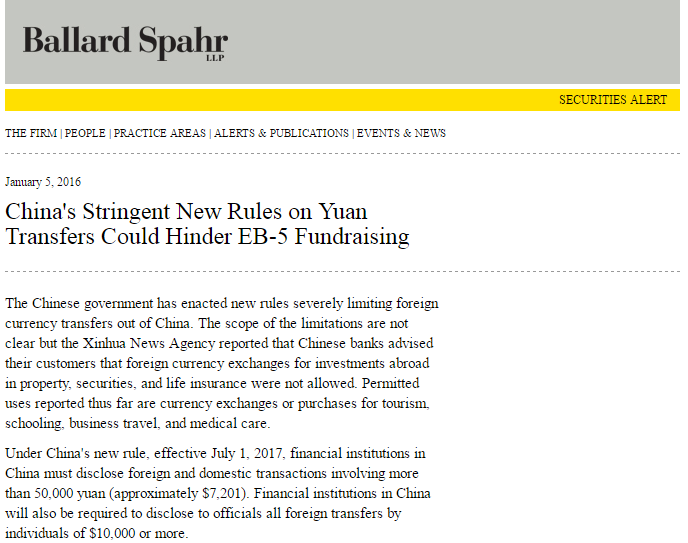China's Stringent New Rules on Yuan Transfers Could Hinder EB-5 Fundraising
The Chinese government has enacted new rules severely limiting foreign currency transfers out of China. The scope of the limitations are not clear but the Xinhua News Agency reported that Chinese banks advised their customers that foreign currency exchanges for investments abroad in property, securities, and life insurance were not allowed. Permitted uses reported thus far are currency exchanges or purchases for tourism, schooling, business travel, and medical care.
Under China's new rule, effective July 1, 2017, financial institutions in China must disclose foreign and domestic transactions involving more than 50,000 yuan (approximately $7,201). Financial institutions in China will also be required to disclose to officials all foreign transfers by individuals of $10,000 or more.
News agencies have reported that tighter control of China's currency market is intended to eradicate money laundering, the funding of terrorism, and financing of "fake" outbound investment transactions, but not standard, valid business activities. The rules were disclosed at the same time as burdens began to rise on the yuan from a recovering U.S. dollar, increasing wealth transfers from China to the United States and beyond. The new rules are also said to arise from unease as to President-elect Trump's threats to limit severely China's exports to the United States.
Until July 1, 2017, the $50,000 annual quota per person will remain unaffected according to reports by China's foreign exchange regulator, which is good news for now for the U.S. EB-5 program and for Chinese investors seeking to complete transactions in 2017. However, scrutiny on foreign currency exchanges will increase, as will penalties for "illegal money outflows," according to China's foreign exchange regulator. In fact, beginning on January 1, 2017, the Bank of Shanghai and China Merchants Bank required completion of an online form when applying to exchange the yuan through mobile banking apps.
Interested participants on both sides of the EB-5 program should attempt to transfer funds before the July 1, 2017 effective date. Ballard Spahr's EB-5 Group will continue to monitor and report on this issue. Likewise, these new rules have broader applicability to U.S. and global real estate and private equity funds, crowdfunding platforms, venture capital transactions, and beyond, which seek to raise funds from high-wealth individuals in China.
Our EB-5 Group brings together attorneys experienced in securities, private equity, business and finance, real estate, tax credits, and corporate law to assist clients to utilize the EB-5 Program to accomplish their goals. The EB-5 Program has led to nearly $15 billion of foreign investment in the United States and more than 220,000 jobs.
Mentions
States
- Maryland
Securities Disclaimer
This website is for informational purposes only and does not constitute an offer or solicitation to sell shares or securities. Any such offer or solicitation will be made only by means of an investment's confidential Offering Memorandum and in accordance with the terms of all applicable securities and other laws. This website does not constitute or form part of, and should not be construed as, any offer for sale or subscription of, or any invitation to offer to buy or subscribe for, any securities, nor should it or any part of it form the basis of, or be relied on in any connection with, any contract or commitment whatsoever. EB5Projects.com LLC and its affiliates expressly disclaim any and all responsibility for any direct or consequential loss or damage of any kind whatsoever arising directly or indirectly from: (i) reliance on any information contained in the website, (ii) any error, omission or inaccuracy in any such information or (iii) any action resulting therefrom.




